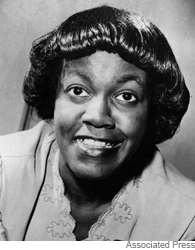Gwendolyn Brooks, renowned poet, was the author of many memorable works centered on the black experience in America and the issues of the Civil Rights Movement. In 1950, she became the first African-American writer to win the Pulitzer Prize.
Gwendolyn Brooks’ Early Days
Gwendolyn Brooks was born on June 7, 1917, in Topeka, Kansas, but her family moved to the South Side of Chicago when she was young. Gwendolyn had a very close relationship with her parents: her father David was a janitor, and her mother Keziah was a schoolteacher. They had higher aspirations for their daughter and always supported her literary inclination.
Gwendolyn originally attended Hyde Park High School, a predominantly white school, but transferred to Wendell Phillips, an all-black school. She eventually went to the integrated Englewood High School. Her first poem, “Eventide,” was published in American Childhood when she was only 13 years old.
Gwendolyn attended Wilson Junior College and graduated in 1936, and went on to work for the National Association for the Advancement of Colored People.
Sources in this Story
- University of Illinois at Urbana-Champaign: Modern American Poetry: Brooks’ Life and Career
- Gale Biography in Context: Gwendolyn Brooks
- The Poetry Foundation: Gwendolyn Brooks (1917-2000)
- Academy of American Poets: Groundbreaking Book: “The Bean Eaters” by Gwendolyn Brooks (1960)
- The New York Times: Gwendolyn Brooks, 83, Passionate Poet, Dies
Brooks’ Poetry
Brooks began attending writing workshops in 1941, where she developed her writing and craft of poetry. In 1945, she submitted a collection of her poems focusing on the lives of poor urban blacks to a publishing house, which published them under the title “A Street in Bronzeville.”
“In these poems, Brooks introduced thematic issues that would feature prominently in her works during the next two decades—family life, war, the quest for contentment and honor, and the hardships caused by racism and poverty,” writes the book Contemporary Heroes and Heroines.
In 1950, Brooks became the first African-American author to win the Pulitzer Prize with a poetry collection titled “Annie Allen,” which chronicled the experiences of a black woman from childhood to adulthood. In a review of the book, poet Langston Hughes wrote, “the people and poems in Gwendolyn Brooks’ book are alive, reaching, and very much of today.”
She wrote the only novel of her career, “Maud Martha,” in 1950, but dedicated herself to poetry after that. In 1960, 10 years after Brooks won the Pulitzer, she published “The Bean Eaters,” a collection that distinctively and daringly addressed the themes and issues of the civil rights movement. In one poem, Brooks even accuses white women of volunteering as “an insincere way of alleviating their consciences,” according to the Academy of American Poets.
Heavily influenced by the black power movement, the style and tone of Brooks’ work changed noticeably in the later 1960s, becoming sharper, more forceful and more political in nature. Inspired by black writers who were “committed to writing as blacks, about blacks, and for a black audience,” Brooks began to think “of herself as an African determined not to compromise social comment for the sake of technical proficiency,” explains The Poetry Foundation.
See the cover of the original copy of “Annie Allen” submitted to the Pulitzer Committee.
See a poster of Brooks’ famous poem, “We Real Cool” (from “The Bean Eaters”), made by Detroit’s Broadside Press in 1966.
The Woman and Her Work
- “Maud Martha”
- “Selected Poems (P.S.)”
- “In Montgomery: And Other Poems”
- “Gwendolyn Brooks: Poetry and the Heroic Voice” by D.H. Melhem
The Rest of the Story
Brooks died on December 3, 2000, in her Chicago home. She was 83 years old. Even though Brooks continued writing late into her life, she never felt compelled to trade the essence of her work for modern trends.
“I don’t want to imitate these young people,” she remarked. “I have got to find a way of writing that will accomplish my purpose but still sound Gwendolynian.”











